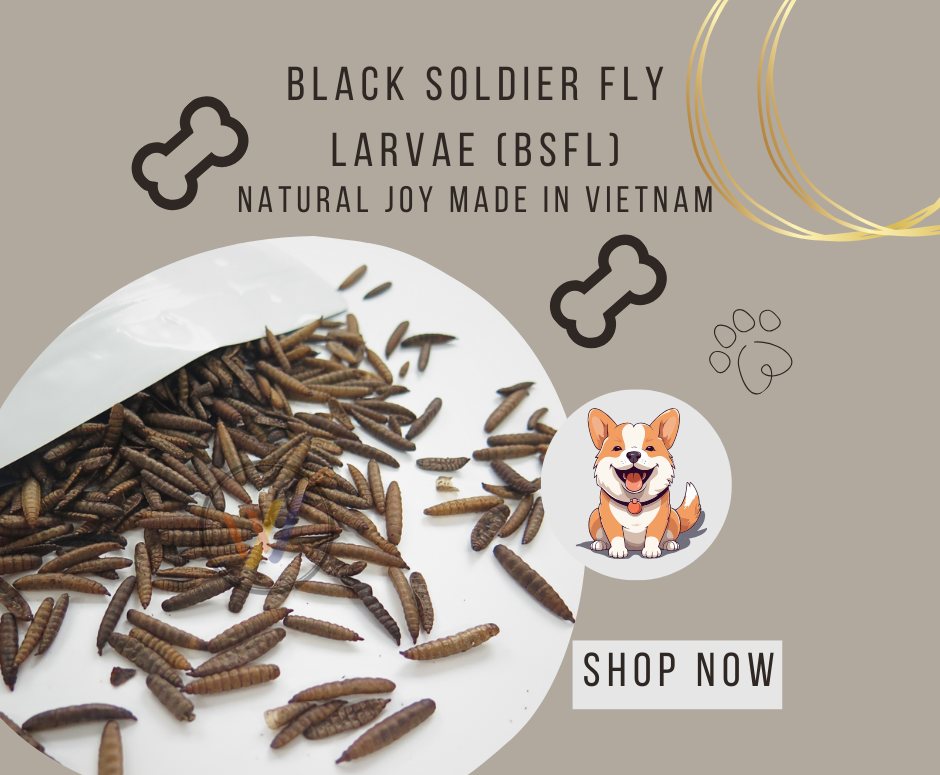BLOG
Why BSFL Production is an Environmentally Friendly Choice
The Sustainability of BSFL Production: Why Choosing BSFL is an Environmentally Friendly Choice
1. Reducing the Impact on Natural Resources
The production of traditional animal meat, particularly beef, pork, and poultry, requires vast amounts of resources such as land, water, and feed. Producing one kilogram of beef can consume thousands of liters of water and tons of feed. In contrast, BSFL can be raised in a closed system using organic waste such as food scraps, agricultural by-products, or waste from food processing plants. By feeding on these waste materials, BSFL helps minimize resource wastage and recycles valuable organic materials.
2. Saving Land and Reducing Deforestation
Raising livestock, especially cattle, requires a large amount of land to grow grass and produce feed for animals. This leads to deforestation and the loss of biodiversity. BSFL, on the other hand, can be produced in compact spaces without the need for large areas of land. This helps reduce the need for land expansion and protects natural ecosystems.
3. Reducing Greenhouse Gas Emissions
The production of traditional animal meat is one of the largest sources of greenhouse gas emissions, primarily from animal digestion processes and waste management. BSFL, when raised in controlled environments, produces far fewer methane and CO2 emissions compared to traditional livestock farming. Studies have shown that BSFL production emits much less greenhouse gas than conventional animal farming.
4. Enhancing Organic Waste Recycling
One of the greatest benefits of using BSFL is its ability to recycle organic waste into a valuable protein source. Food waste, agricultural by-products, and even waste materials from food processing can be used to feed BSFL. This not only helps reduce pollution but also creates a circular process where waste is recycled into a useful product, benefiting both the economy and the environment.
5. Energy Efficiency
The process of producing protein from BSFL also consumes significantly less energy compared to traditional animal farming. BSFL grow quickly in controlled environments and do not require complex farming conditions, which saves energy and reduces the environmental impact of production.
6. Promoting Sustainable Food Industry
Using BSFL in animal feed not only benefits the environment but also helps promote a more sustainable food industry. Companies and food brands are increasingly focused on reducing their carbon footprint, and using BSFL is one of the most effective ways to achieve this goal. This marks a significant shift in the food industry towards more sustainable alternatives, offering options that are beneficial to human health and the planet.
In Conclusion
Choosing BSFL is an environmentally friendly option because it recycles organic waste, minimizes natural resource consumption, saves land and energy, and contributes to reducing greenhouse gas emissions. Transitioning to BSFL in animal feed production is a major step towards a more sustainable food system that not only protects the environment but also reduces reliance on traditional animal proteins.
If you are looking for a safe, nutritious, and eco-friendly food option for your pets, consider Dried Black Soldier Fly Larvae products. This innovative solution provides health benefits for pets while helping to protect our planet.
WINVN INT CO., LTD
Natural joy made in Vietnam
☎️ +84 932 118 447
📧 info@winvnint.com
🌐 winvnint.com
🌐 https://winvnint.trustpass.alibaba.com/
📌 29, 29 Street, Van Phuc Residence, Thu Duc City, Ho Chi Minh City, Vietnam
 Tel: (+84) 932 118 447
Tel: (+84) 932 118 447  Email: info@winvnint.com
Email: info@winvnint.com 










